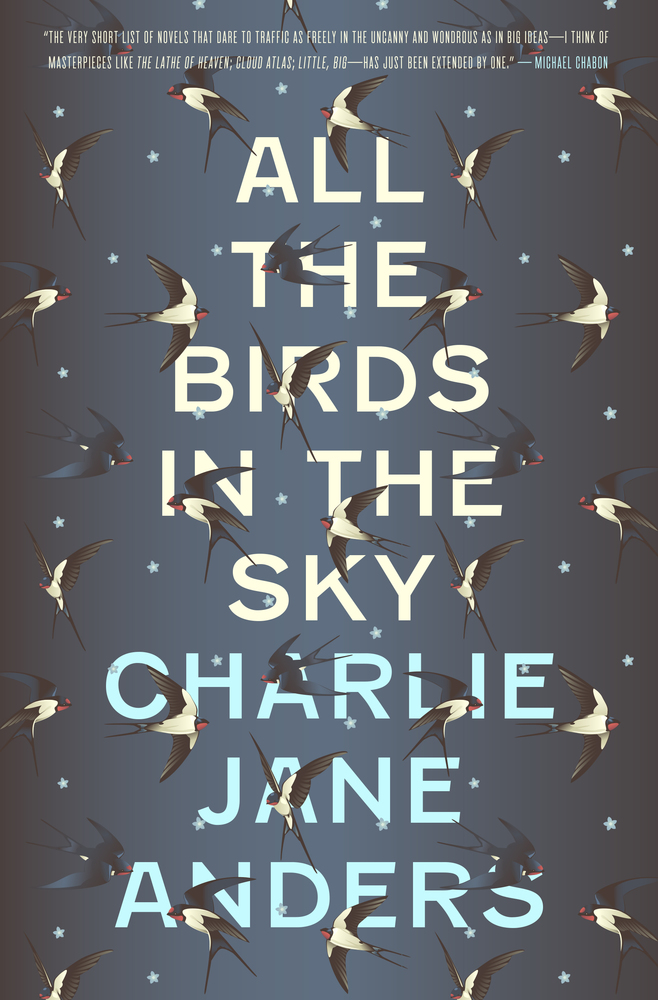"I don't actually think that ethics are derived from principles. At all." Patricia scooted a little closer again and touched his arm with a few cool fingertips. "I think that the most basic thing of ethics is being aware of how your actions affect others, and having an awareness of what they want and how they feel. And that's always going to depend on who you're dealing with."
All the Birds in the Sky, by Charlie Jane Anders, is delightful. I can easily see it being quite a few people's favourite new book, and I've recommended it to some friends as such.
I was a little wary because I'm wary of magic. I just am. Don't mess with magic. Maybe because I don't believe in magic (apart from the magic principles my microwave, for example, and airplanes and the internet operate on), I think it's very difficult to write well — that is, believably.
And the ultimate showdown between magic and science, as this novel was being made out to be, just sounds simplistically grandiose.
But then the Tournament of Books happened, and there was so much love for this book, and dismay when it was knocked out of the running, and hope when it looked it might return as a crowd favourite. So I rushed to my library, and yay.
It turns out it's not really about magic or science. It's a love story. It's about misfit schoolmates Patricia and Laurence and the bonds that develop between them. Patricia is eventually whisked off to magic school, and Laurence becomes the genius scientist we always knew he would be. As adults, their lives collide. A scientist would control nature, but a witch must serve it.
It's light — that is, there's a lightness to it, lightness of touch, lightness of heart. It made me feel happy — but not because of the story, almost in spite of the story. Happy to be immersed in this kind of book. This is a book I wanted to stay up all night with. I loved the experience of this book more than the book itself.
I read it over a cold and still snowy weekend just over a week ago, and I've mostly forgotten the story. I do, however, remember the feeling of reading this story, which is sometimes more important.
Patricia had to crouch down to talk to a confused marmalade cat, who needed help finding his way home. (He remembered what his house looked like on the inside, but not on the outside.)While it's a lovely book, I don't understand what's so original or genre-bending about this book. It seems to have cast its own spell on its readership. It's sweet and funny, with some great turns of phrase (though, I'm still puzzling over what exactly "Boredom is the mind's scar tissue." actually means).
As for the Tournament, All the Birds in the Sky won over Han Kang's The Vegetarian:
Perhaps because, political situations being what they are, I wanted to know that I was in the hands of a writer who wouldn't be falsely optimistic, but could still bring me joy.But then it lost to Colson Whitehead's The Underground Railroad:
Anders’s prose — pretty, joyous, and inventive — felt a little too light next to Whitehead’s. Perhaps that feeling came from my own headspace, which is currently dark and stormy. But The Underground Railroad called to me more urgently than All the Birds in the Sky. I suspect in any other year, alongside any other book, the latter would win, in a landslide. But here we are. Happy 2017.One judge liked its hope, the other opted for a strong dose of reality (despite the liberties taken in expressing that reality).
Had it been up to me to choose between All the Birds in the Sky and The Vegetarian (the only two books of the tournament I've read), I would have talked about trees. Treeness figures in both stories: In The Vegetarian Yeong-hye wants to become a tree — plant matter is persistent, if mute. In All the Birds in the Sky, the Tree is all-knowing; nature ultimately merges with science. The oneness the tree represents is in one case internal, in the other external. Though I read it months ago, The Vegetarian took root in me, and I vastly prefer the feeling of being deeply unsettled over the fleeting flush of All the Birds.
After Laurence and Serafina drifted away, Patricia told Kevin, "I didn't really save his life. He was exaggerating."
Kevin shrugged, causing his watch chain to jangle. "It's his life. One tends to privilege personal insights in such matters."



No comments:
Post a Comment